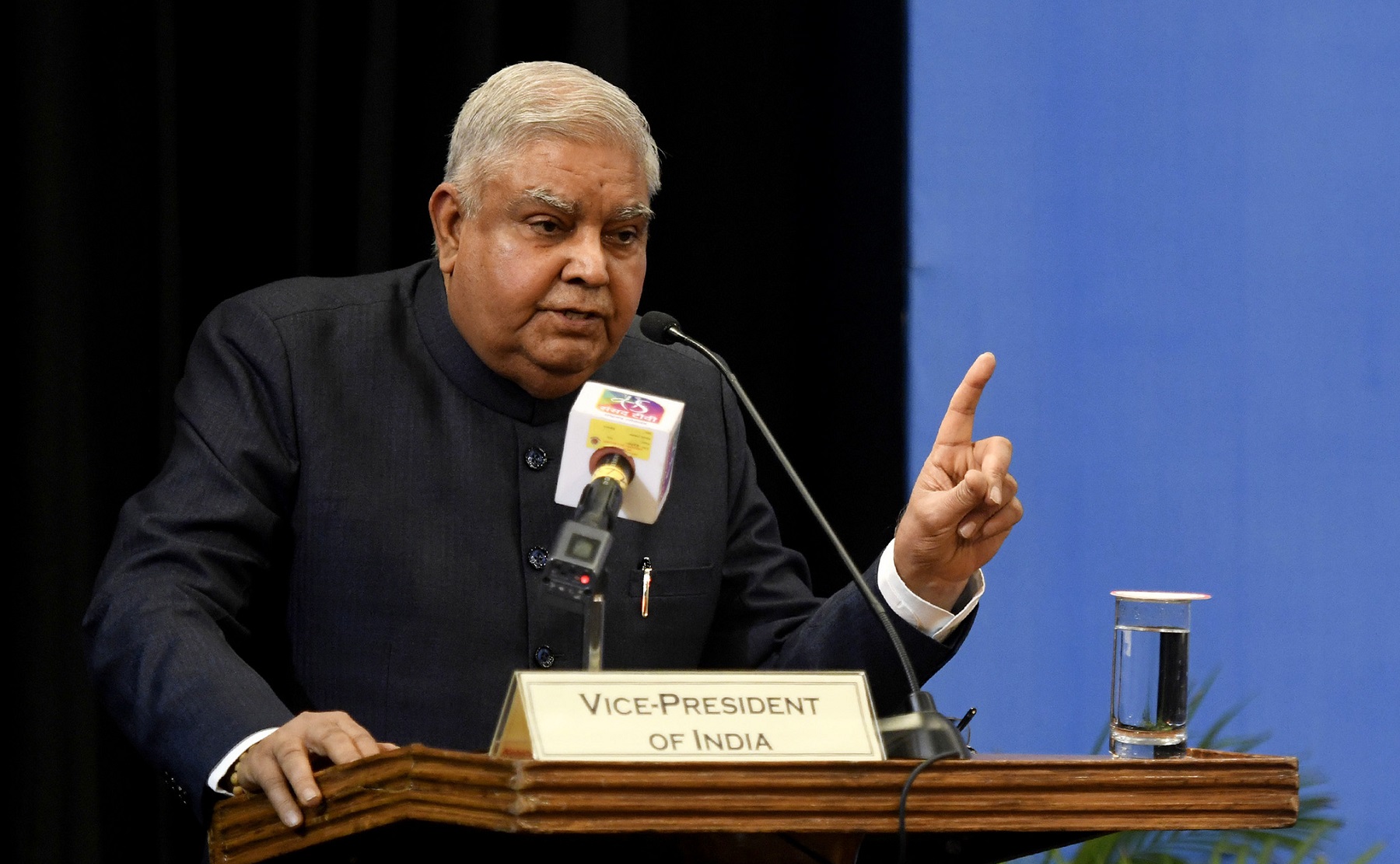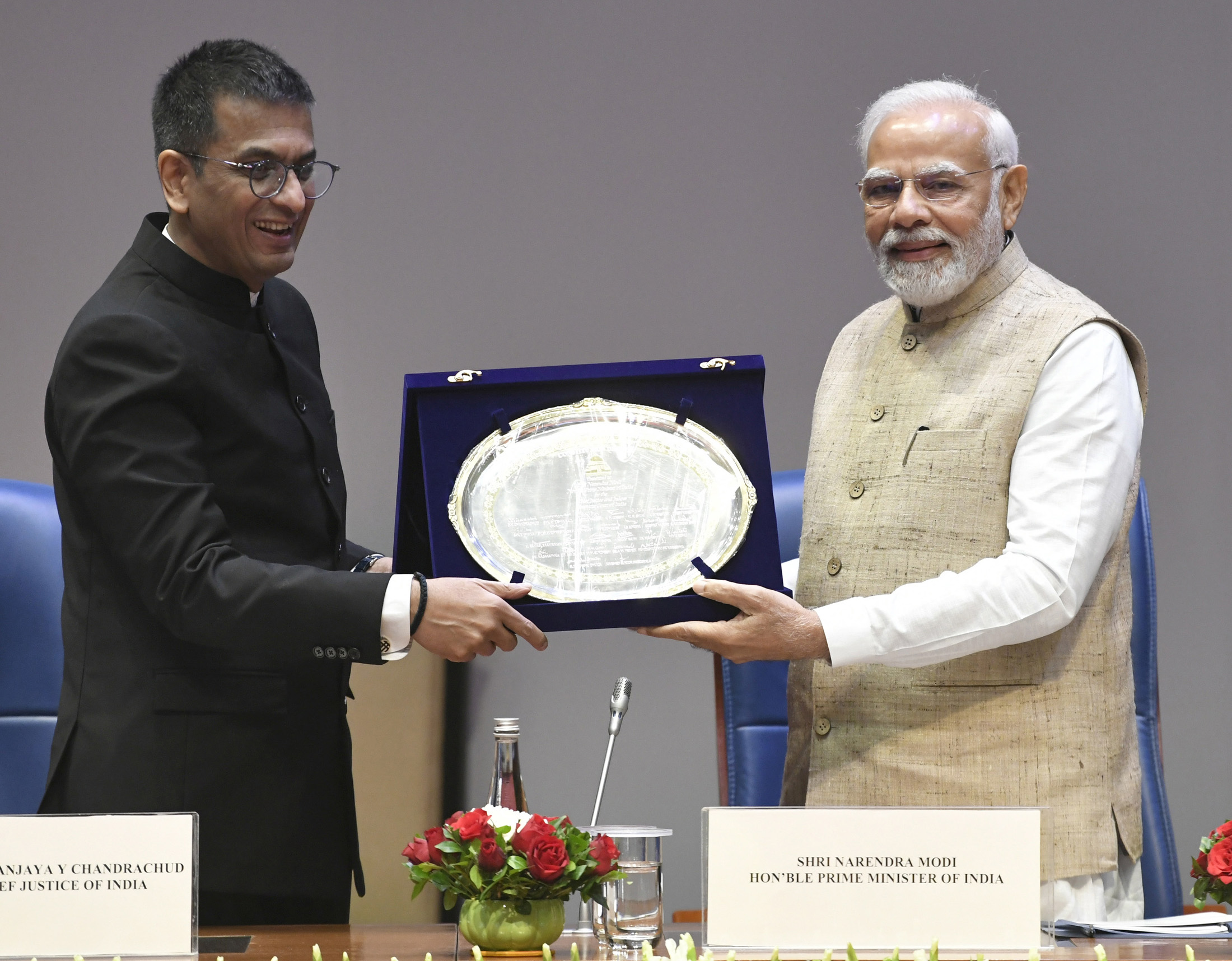
Vice President takes on Supreme Court over collegium system of Judges’ appointment
The government versus Supreme Court tussle over the appointment of judges in the Supreme Court and high courts has again come under the spotlight with Vice President of India Jagdeep Dhankhar raising the issue in his maiden address in the Rajya Sabha.
The National Judicial Appointments Commission (NJAC) Bill, passed unanimously by the Parliament, was “undone by the Supreme Court”, said Dhankhar, terming it is a “severe compromise of parliamentary sovereignty and disregard of the mandate of the people”.
The Bill which sought to overturn the collegium system of appointing Supreme Court and high court judges, was struck down by the Supreme Court.
Vice President said a law passed by Parliament, which reflects the will of the people, was “undone” by the Supreme Court and “the world does not know of any such instance”.
Citing provisions of the Constitution, he also said when a substantive question of law is involved, the issue can be looked into by the courts.
“Nowhere it says a provision can be run down,” Vice President Dhankhar said in the presence of Chief Justice of India DY Chandrachud.
Addressing the LM Singhvi memorial lecture in Delhi, the Vice President underlined that the Preamble of the Constitution mentions “We the people” and Parliament reflects the will of the people.
It means the power resides in the people – their mandate and their wisdom, he said.
Vice President Dhankhar referred to the NJAC Act, saying in 2015-16, Parliament was dealing with a constitutional amendment Act and as a matter of record the entire Lok Sabha voted unanimously.
In Rajya Sabha, it was unanimous, there was one abstention. “We the people – their ordainment was converted into a constitutional provision. Power of the people, which was expressed through a legitimate platform, that power was undone. The world does not know of any such instance,” he said.
The NJAC Act, which sought to overturn the collegium system of appointing Supreme Court and high court judges, was struck down by the Supreme Court which described it as unconstitutional.
“I appeal to the people here, they constitute a judicial elite class, thinking minds, intellectuals – please find out a parallel in the world where a constitutional provision can be undone,” he said.
Vice President Dhankhar had expressed similar sentiments at a Constitution Day event in Delhi on November 26.
He said he was “startled that after this verdict (NJAC), there was no whispering in Parliament. It was taken as such. This is too serious an issue”.
Referring to the doctrine of basic structure developed by the Supreme Court, he said “we have taken it as such”.
“But as a modest student of law, can parliamentary sovereignty ever be compromised … can a successive Parliament be bound by what has been done by earlier Parliament,” he said.
He said harmonious working of the Executive, the Legislature and the Judiciary is vital for the growth of democracy. “Any incursion, howsoever subtle, in the domain of one by another has the capacity to unsettle the apple cart of governance,” the Vice President said.

Nowadays it has become a fashion to comment on earlier decisions of the Collegium: SC
Nowadays it has become a “fashion” for the former judges to comment on earlier decisions of the Collegium on the appointment of judges in the Supreme Court and high courts, the Supreme Court has said adding that the apex court was the “most transparent institution”.
“We do not want to comment on anything said by former members [of the Supreme Court Collegium]… We don’t want to say or comment on them at all… Nowadays it has become a fashion to comment on earlier decisions when they were part of the Collegium,” Justice M.R. Shah, leading a Bench, said.
The Supreme Court on December 2, 2022 said it had become a “fashion” for its former judges to comment on earlier decisions of the Collegium when they were part of it while adding that the apex court was the “most transparent institution”.
“We do not want to comment on anything said by former members [of the Supreme Court Collegium]… We don’t want to say or comment on them at all… Nowadays it has become a fashion to comment on earlier decisions when they were part of the Collegium,” Justice M.R. Shah, leading a Bench, said.
The oral observation came during the hearing of an appeal filed by activist Anjali Bhardwaj, who had applied under the Right to Information (RTI) Act to the Supreme Court for a copy of the agenda, decision and resolution of a Collegium meeting held on December 12, 2018.
The Supreme Court Public Information Officer (PIO) had said the information was confidential and disclosure would amount to contempt of court. The First Appellate Authority and the Central Information Commission found that though “certain decisions” were taken on December 12, the “required consultation” did not take place and hence there was no resolution. In appeal, the Delhi High Court had concluded that the Collegium decision was probably “verbal” and did not “crystallise” into a written record to be termed ‘information’ under the RTI Act.
On Friday, advocate Prashant Bhushan, for Ms. Bhardwaj, referred to an article by Justice Madan B. Lokur, a former Supreme Court judge, affirming there was an agenda of the Collegium meeting held on December 12 and “certain decisions” had indeed been taken.
Mr. Bhushan further pointed to excerpts in the autobiography of former Chief Justice of India Ranjan Gogoi about the December 12 meeting. Justice Gogoi had headed the Collegium at the time and Justice Lokur was part of that Collegium. The meeting was held to consider names for appointment to the Supreme Court and transfers of Chief Justices of High Courts. Justice Lokur had retired when the court went into winter recess soon after the December 12 meeting.
A newly-constituted Collegium, with Justice (now retired) Arun Mishra joining in, had met on January 10, 2019. A resolution published of the January 10 meeting had recorded that decisions were taken in the previous meeting, but intervening winter holidays and the reconstitution of the Collegium had interrupted consultations. The January 10, 2019 Collegium resolution had recommended Justices Dinesh Maheshwari and Sanjiv Khanna as Supreme Court judges.
A public debate in the media had ensued at the time on why the Collegium had “dropped” its December 12, 2018 proposal to recommend Delhi High Court Chief Justice Rajendra Menon and Rajasthan High Court Chief Justice Pradeep Nandrajog (both are now retired) and, within days, pick then Karnataka High Court Chief Justice Maheshwari and Justice Khanna, a Delhi High Court judge. Both Justices Maheshwari and Khanna are now serving apex court judges. Justice Khanna is in line to be the next Chief Justice of India according to the seniority norm.
‘General impression’
Mr. Bhushan said a “general impression” may arise that the Supreme Court, which had once upheld the right to information as a fundamental right in several of its judgments, was now “backtracking”.
“Transparency requires that whatever decision, if it is in writing, be disclosed to citizens. If the decision is not in writing, let the PIO say so,” he argued. Mr. Bhushan asked if the decision had not been converted to writing, why did the January 2019 resolution say that “a decision was taken”.
“The Supreme Court is not backtracking at all. We are the most transparent institution… An oral decision may have been taken [in the December 12, 2018 Collegium meeting]. You are not entitled to the oral decisions… The decision may not have been converted to writing… So many things could have been discussed in the Collegium meeting,” Justice Shah, who is a member of the current Collegium headed by Chief Justice D.Y. Chandrachud, responded.
The court reserved the appeal for judgment. The past weeks had seen Union Law Minister Kiren Rijiju launch a vocal and very public criticism of the “opacity” in the functioning of the Collegium.
(Source: The Hindu)






